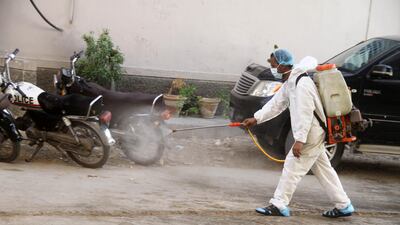An unexpected fall in Pakistan's daily coronavirus toll has been seized on by ministers as proof the country's strategy is working, but met opposition accusations the government is fiddling the numbers.
Daily death and case tallies have both fallen in recent weeks, confounding earlier predictions that the outbreak would keep getting worse until at least the end of July.
Nationwide death tolls have fallen from as high as 150 per day in mid-June to around 70 or 80 per day now. Daily case totals have also fallen from as high as 6,000 per day last month, to now hovering around 3,000. The total number of positive cases in Pakistan stands at 246,351, of which 5,123 people have died.
Imran Khan's government has said the fall justifies its new “smart lockdown” strategy which has seen individual neighourhoods containing virus hotspots sealed up by police for up to 14 days.
Yet the fall has coincided with a sharp drop in testing, with around a quarter fewer people being tested for the coronavirus each day.
Senator Sherry Rehman, opposition leader for the Pakistan Peoples Party in the senate, said testing appeared to have been cut deliberately, to reduce the case numbers.
"If they don't test or ramp up testing, then obviously there are fewer cases," she told The National.
She accused Mr Khan's government of squandering time during the outbreak's early days that could have been used to ready hospitals and a better tracking and tracing system.
“It's quite conscious that they never came up to the numbers that they promised to test,” she said.
Asad Umar, the planning minister overseeing the government's response, said on Saturday that the figures from hospitals were also improving. The number of Covid-19 patients on ventilators had fallen a quarter since June 20, he said.
“The effect of smart lockdown, administrative actions to implement standard operating procedures, and most importantly better public cooperation is significantly visible,” he tweeted.
Faisal Sultan, the epidemiologist who is Imran Khan's special adviser on Covid-19, said last week that the reduction in testing was due to a fall in demand, with fewer people feeling ill. Tests on all air passengers entering Pakistan have also been halted.
International health officials have admitted that the fall in testing has made it more difficult to judge the shape of the epidemic. Official caseloads have never represented the true scale of the outbreak in the country.
As recently as a fortnight ago, ministers were bracing for the outbreak not to peak for weeks. One senior official involved in the response had said then that the predictions for late July “look bad”.
"We’re looking into why testing has gone down. The models and current figures just don’t align," said one international official.
Individual neighbourhoods across the country meanwhile continue to be locked down.
Mr Khan has pleaded with Pakistanis to celebrate the upcoming Eid ul-Adha holiday cautiously. Careless socialising during Eid ul-Fitr celebrations at the end of Ramadan in May were blamed for creating June's surge of cases and health officials fear a re-run at the end of this month.

